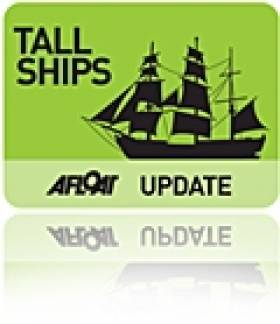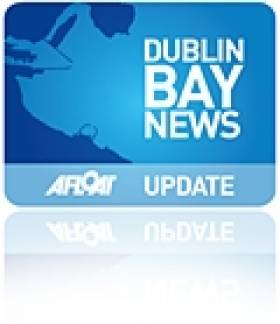Displaying items by tag: Convention Centre
Sailing Opportunities on 115-year French Tall-Ship
If you are interested in this adventure, registration is open until 1 March for those registering through the Alliance Française. A special Alliance Française price (excluding insurance) costs €780 and for €660 for those under 20 years of age. To book your place email: [email protected]
In July last year, the Belem, was chartered to make a special voyage to Dublin to celebrate the 50th Anniversary of Alliance Française in the capital. Taking part in the passage from Roscoff were 17 Irish people who joined in the crew. The four-day visit also celebrated the French national day, Bastille Day (14 July) which formed part of the inaugural French Market, held on the quayside close to the Convention Centre.
The ship was launched on June 10th 1896 and built in Nantes. She was named the Belem, after the north Brazilian port where the Crouan family had founded a trading post a few generations earlier. For nearly two decades the Belem sailed the Atlantic, carrying a diverse range of cargo but mostly spices, sugar and cocoa beans. The Belem would sail upriver on the River Seine to supply the cocoa beans for a Paris-based chocolate-maker.
During her long and varied career, the barque was sold to Arthur Ernest Guinness in 1921. Under the control of the Irish brewing dynasty, the vessel was renamed Fantôme II. The Guinness family established a strong attachment to the vessel which was completely refurbished from a working cargo vessel into that of a luxurious appointed yacht capable of accommodating 40 guests. Part of the work included an extension to the deckhouse for the purposes of a floating office, so business could be conducted, wherever the vessel happened to be.
In the period between March 1923 to March 1924 the Fantome went on a round the world tour going through the Panama Canal on the way out and returning via the Suez Canal.
Since 1987 the Belem has provided sail-training opportunities and is owned and operated by the Belem Fondation, a Paris based organisation set up by the Caisses d'Epargne, BPCE Group, after they bought back the ship in 1979. The principle role of the foundation is to keep the three masted barque as part of France's National Heritage. The vessel's historical and cultural significance was recognised in 1984 when the French government listed the barque as an historic monument.
Aside the role of sail training the Belem is unique in that she continues to carry occasional commercial cargo. In recent years the vessel has carried cargoes of wine from Bordeaux to Montreal in the Canadian French speaking province of Quebec. For information about Alliance Française in Ireland logon HERE in addition to the history and work of the Belem Foundation by clicking here.
Looking for further reading on Tall Ships in Ireland? Click the links below:
Click this link to read all our Tall Ships Stories on one handy page
Previewing Ireland's Tall Ships 2011 Season
Can Ireland Get a New Tall Ship?
Dublin Port Tugs Making Magic 'Rainbow' Happen
The spectacular effect of the life-size rainbow had never been achieved before in Ireland. Steve Green, the director of the advertisement used a 35mm film, with footage from HD cameras, including one mounted on the helicopter which hovered over the 'new' landmarks of the 'Docklands'.
The imaginative advertisement was created by Sweet Media, the production company chosen to produce the campaign, under the direction of the National Lottery's advertising agency, DDFH&B. The soundtrack for 'Making Magic Happen' is the appropriately titled 'Pocketful of Rainbows', sung by Elvis Presley. The version used is Take 16 from the 1960 recording sessions for the 'G.I. Blues' soundtrack.
As for the stars of the advert, the tugs are named after Irish figures, Shackleton, named in honour of Antartic explorer Sir Ernest Henry Shackleton and Beaufort, named after Navan-born, Sir Francis Beaufort, who created the world-renowned wind-scale measurement.
The 50-bollard ton tugs cost €6m each and were built at the Astilleros Zamakona Shipyard, Bilbao. In March the tugs officially entered service after a joint naming ceremony was held in Dublin Port.
To view the tugs in water-firing, making magic mode!... click the link here

























































